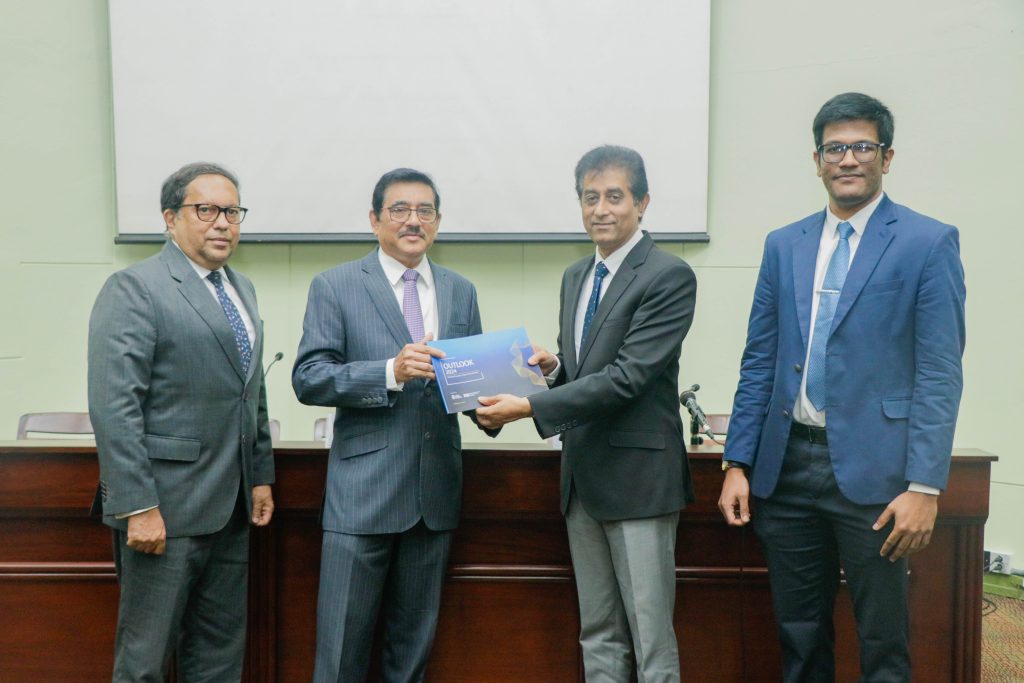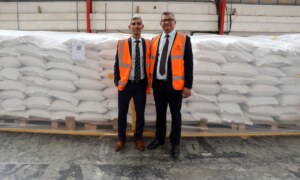
The 9th edition of the annual flagship Outlook Report for 2024 by The Ceylon Chamber of Commerce was recently launched at the Economic Outlook 2024 seminar. Dr. Nandalal Weerasinghe, Governor of the Central Bank of Sri Lanka, delivered the keynote address at the launch event.
Compiled by the Economic Intelligence Unit (EIU) of the Ceylon Chamber, the report provides insights into crucial business planning variables such as growth, inflation, interest rates, and exchange rates.
The theme for this year’s report is “Striving towards a New Growth Path.” It
comprehensively reviews the performance of the domestic, global, and regional economies, offering perspectives on key sectors such as tourism, apparel, IT/BPM, FMCG, tea, banking, and renewable energy.
Delivering the opening remarks, Duminda Hulangamuwa, Chairman of The Ceylon Chamber emphasized that ‘the current issues can be resolved with the implementation of reforms that will benefit the common people”.
Speaking at the event, Dr. Nandalal Weerasinghe affirmed that “there
are positive signs of 3% growth. The reforms may be difficult, but they will produce results if they are well-directed’, adding that ‘we can expect a surplus in the external sector in 2024 if we manage the fiscal balances and create spillover effects”.
Presenting the Outlook report, Sanjaya Ariyawansa – Economist, Ceylon Chamber, emphasised that Sri Lanka’s economic growth is poised for a modest recovery in 2024. This follows a challenging period in 2023, marked by economic contraction, only to witness a positive growth of 1.6 percent in the third quarter.
The anticipated rebound depends crucially on effective debt restructuring and the implementation of key structural reforms aimed at achieving macroeconomic stability.
The report further highlighted that inflation is expected to stabilize at a mid-single-digit level in 2024, following significant disinflation in 2023. The external sector of the Sri Lankan economy exhibited marked improvement in 2023, with a notable reduction in the merchandise trade deficit
and a surge in net service exports, particularly in tourism, along with a remarkable improvement in inflows of workers’ remittances.
In terms of monetary policy, the Central Bank shifted to a more accommodative stance in 2023 to support economic recovery and manage inflation. Despite facing a significant budget deficit in 2023 with rising interest expenditure, a primary budget surplus was achieved through revenue-based fiscal consolidation.
The global economy is anticipated to slow down in 2024, accompanied by potential geopolitical risks, financial challenges in weaker economies, and persistent inflation pressures. The report also highlighted the potential disruptions to domestic economic recovery, including a slowdown in
exports due to global economic slowdown.
Despite the proposed elections in 2024, Ariyawansa emphasised the government’s continued focus on implementing key structural reforms to support economic recovery. This includes enhancing governance, improving public sector efficiency, and fostering a conducive environment
for private sector growth. Such reforms are deemed essential to avoid repeated reliance on external financial support.
Session panelists included Murtaza Jafferjee, Committee Member, SOE Restructuring Unit; Supun Weerasinghe, CEO, Dialog Axiata PLC; Riyaz Sangani, CEO, Vidullanka PLC; Charitha Subasinghe, President-Retail, John Keells Holdings PLC; and Dr. Roshan Perera, Senior Research Fellow, Advocata Institute.
The panelists shared several viewpoints on the economic outlook for 2024, including measures that need to be taken to ensure stability and progress. Jafferjee stated that ‘the sooner we reform the SOEs, the sooner we reap the benefits’, with Dr. Perera expressing similar sentiments, stating that ‘structural reforms will complement the tight monetary and fiscal policies.’
Weerasinghe meanwhile referenced the imperative for the Digital ID, emphasizing the ‘need to resume the Digital ID Project as soon as possible. This is essential for increasing our tax revenue’.
Referencing overall economic growth, Subasinghe stressed that ‘we need to pursue a growth strategy that is inclusive and equitable. Everyone should benefit from the expansion of the corporatE sector.”
Sangani also echoed this viewpoint, emphasizing that ‘the key factor is how we execute the plans. We can expect lower prices when we break the monopoly. This will have a positive impact on many sectors of the economy.’




Leave a comment